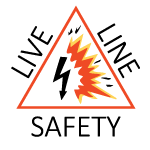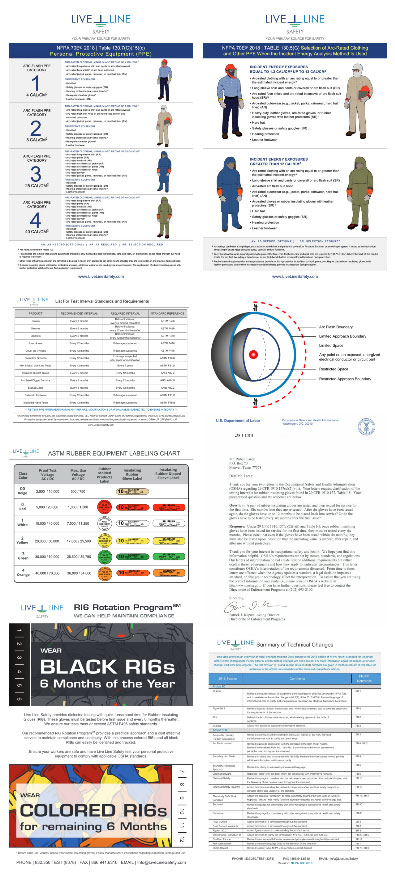Do only electricians need electrical safety training?
One of the biggest misconceptions we hear most. My question to you, do only electricians get electrocuted or die from arc flash exposures? Electrical safety training is designed for any employee who works on or near energized electrical conductors and circuit parts operating at voltages equal to or greater than 50 volts. [OSHA 29 CFR 1910.332(a)]
Is online training acceptable?
According to a recent Letter of Interpretation, the Acting Director of OSHAs Directorate of Enforcement Programs confirmed a 1994 Letter of Interpretation as still applicable today.
Online, self-paced computer-based training can be a valuable part of an effective safety and health training program. However, the use of online training by itself would not be sufficient to satisfy OSHA training requirements unless that training contains interactive and hands-on components. To be effective, training must result in mastery of the training material [such as, for example, safe work practices or the safe and appropriate use of tools and personal protective equipment]. Online training without interactive and hands-on components would not meet this goal.
Read more here: https://www.osha.gov/laws-regs/standardinterpretations/2019-07-11
How much does training cost?
Live Line Safety can provide a free estimate once we determine the best training program for your employees. We also offer significantly discounted classes based on the number of attendees and the amount of sessions. Simply contact us to get started with a consultation. We’re very flexible, very competitive in pricing and very effective.
How long does a class last?
Often a simple consultation will determine what training is best for the employer and employees. Classes can be a minimal 2 hour awareness class for unqualified workers and up to a 2 day training class for qualified workers depending on the specific issues that need to be addressed.
Do you offer onsite training and do you travel?
In most all cases the training is done onsite and we most definitely travel. We will do our best to accommodate you. Contact us for your free consultation.
Is the employer required to provide electrical safety training?
Each employer must furnish to each of his employees employment and a place of employment which are free from recognized hazards that are causing or are likely to cause death or serious physical harm to his employees. [Public Law 91-596, “Occupational Safety and Health Act of 1970” SEC. 5.(a) Duties]
Does the employee have to comply with the safety-related work practices and procedures provided by the employer?
Each employee must comply with occupational safety and health standards and all rules, regulations, and orders issued pursuant to this Act which are applicable to his own actions and conduct. [Public Law 91-596, “Occupational Safety and Health Act of 1970” SEC. 5.(b) Duties]
How often do I need electrical safety training?
Retraining in safety-related work practices and applicable changes in this standard shall be performed at intervals not to exceed 3 years. An employee shall receive additional training [or retraining] if any of the following conditions exists:
(1) The supervision or annual inspections indicate the employee is not complying with the safety-related work practices.
(2) New technology, new types of equipment, or changes in procedures necessitate the use of safety-related work practices different from those that the employee would normally use.
(3) The employee needs to review tasks that are performed less often than once per year.
(4) The employee needs to review safety-related work practices not normally used by the employee during regular job duties.
(5) The employee’s job duties change.
NFPA 70E 2024, Section 110.4(A)(3)
Are we required to use NFPA 70E®?
The General Duty Clause is not used to enforce the provisions of consensus standards, although such standards are sometimes used as evidence of hazard recognition and the availability of feasible means of abatement. Since NFPA 70E is substantially prescriptive based, OSHA looks to NFPA 70E to fill out the performance based requirements included in their standards, especially since NFPA 70E is the American National Standard on the subject and sets the bar for safe work practices.
Do I need PPE to Lockout|Tagout?
While performing Lockout/Tagout, the electrical worker assumes only one thing about electrical equipment, that it is always energized. NFPA 70E 2024, Section 130.7(A) reads, “Employees exposed to electrical hazards when the risk associated with that hazard is not adequately reduced by the applicable electrical installation requirements shall be provided with, and shall use, protective equipment that is designed and constructed for the specific part of the body to be protected and for the work to be performed.”
Is maintenance of the electrical system important?
NFPA 70B shifted from a “Recommended Practice” to a “Standard” containing mandatory language. The new standard will impact electrical infrastructure installed in industrial plants, institutional and commercial buildings, and large multifamily residential complexes. Unlike the state-adopted National Electric Code (NEC), NFPA 70B is not a code or directly mandated by law. However, much like NFPA 70E, NFPA 70B is considered the minimum consensus requirements for safe electrical work practices and the Occupational Safety and Health Administration (OSHA) can utilize the standard to issue citations.
How do I know if I am qualified?
A license, diploma, or certificate does not necessarily make you a qualified person under the requirements of NFPA 70E. A qualified person shall be trained and knowledgeable in the construction and operation of equipment or a specific work method and be trained to identify and avoid the electrical hazards that might be present with respect to that equipment or work method. [NFPA 70E 2018, 110.2(A)(1)]
Do you train unqualified workers?
Training is available to both qualified and unqualified workers. Often a simple consultation will determine what training is best for the employer and employees. Classes can be a minimal 2 hour awareness class to a 2 day training class depending on the specific issues that need to be addressed.
Can I work on energized equipment?
Live parts must be de-energized before the employee works on or near them. Energized work requires the employer to demonstrate that de-energizing introduces additional or increased hazards or is infeasible due to equipment design or operational limitations. Live parts that operate at less than 50 volts to ground must be evaluated to determine if there is an increased exposure to electrical burns or to explosion due to electric arcs. [OSHA 29 CFR 1910.333(a)(1)]
Do you offer other training classes?
I have many resources so whatever you’re looking for, I can point you in the right direction but I stick to what I know best and in regards to training, my subject matter is electrical safety. I have been in the electrical industry since 2002, I am a licensed State of Texas Master Electrician, and my wife + I run an electrical contracting business. We also own Live Line Safety, an electrical PPE test lab in Pearland, Texas. So I do electrical work, run an electrical contracting business, test electrical PPE, sell arc flash + electric shock PPE and train on electrical safety. Electrical safety is what I do!
YOUR PRIMARY SOURCE FOR SAFETY
Specializing in Electrical Personal Protective Equipment [PPE] Safety Testing, Sales + Training. Dedicated to providing Employers and Employees with the necessary tools + services to maintain compliance with OSHA.

